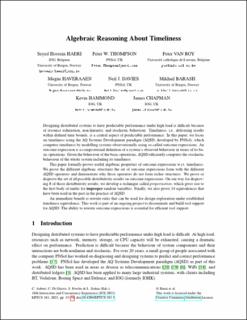| dc.contributor.author | Haeri, Seyed Hossein | |
| dc.contributor.author | Thompson, Peter W | |
| dc.contributor.author | Van Roy, Peter | |
| dc.contributor.author | Haveraaen, Magne | |
| dc.contributor.author | Davies, Neil J | |
| dc.contributor.author | Barash, Mikhail | |
| dc.contributor.author | Hammond, Kevin | |
| dc.contributor.author | Chapman, James | |
| dc.date.accessioned | 2023-09-06T09:10:10Z | |
| dc.date.available | 2023-09-06T09:10:10Z | |
| dc.date.created | 2023-08-22T10:47:43Z | |
| dc.date.issued | 2023 | |
| dc.identifier.issn | 2075-2180 | |
| dc.identifier.uri | https://hdl.handle.net/11250/3087695 | |
| dc.description.abstract | Designing distributed systems to have predictable performance under high load is difficult because of resource exhaustion, non-linearity, and stochastic behaviour. Timeliness, i.e., delivering results within defined time bounds, is a central aspect of predictable performance. In this paper, we focus on timeliness using the DELTA-Q Systems Development paradigm (DELTA-QSD, developed by PNSol), which computes timeliness by modelling systems observationally using so-called outcome expressions. An outcome expression is a compositional definition of a system's observed behaviour in terms of its basic operations. Given the behaviour of the basic operations, DELTA-QSD efficiently computes the stochastic behaviour of the whole system including its timeliness. This paper formally proves useful algebraic properties of outcome expressions w.r.t. timeliness. We prove the different algebraic structures the set of outcome expressions form with the different DELTA-QSD operators and demonstrate why those operators do not form richer structures. We prove or disprove the set of all possible distributivity results on outcome expressions. On our way for disproving 8 of those distributivity results, we develop a technique called properisation, which gives rise to the first body of maths for improper random variables. Finally, we also prove 14 equivalences that have been used in the past in the practice of DELTA-QSD. An immediate benefit is rewrite rules that can be used for design exploration under established timeliness equivalence. This work is part of an ongoing project to disseminate and build tool support for DELTA-QSD. The ability to rewrite outcome expressions is essential for efficient tool support. | en_US |
| dc.language.iso | eng | en_US |
| dc.publisher | Open Publishing Association | en_US |
| dc.rights | Navngivelse 4.0 Internasjonal | * |
| dc.rights.uri | http://creativecommons.org/licenses/by/4.0/deed.no | * |
| dc.title | Algebraic Reasoning About Timeliness | en_US |
| dc.type | Journal article | en_US |
| dc.type | Peer reviewed | en_US |
| dc.description.version | publishedVersion | en_US |
| dc.rights.holder | Copyright 2023 the authors | en_US |
| cristin.ispublished | true | |
| cristin.fulltext | original | |
| cristin.qualitycode | 1 | |
| dc.identifier.doi | 10.4204/EPTCS.383.3 | |
| dc.identifier.cristin | 2168657 | |
| dc.source.journal | Electronic Proceedings in Theoretical Computer Science (EPTCS) | en_US |
| dc.source.pagenumber | 35-54 | en_US |
| dc.identifier.citation | Electronic Proceedings in Theoretical Computer Science (EPTCS). 2023, 383, 35-54. | en_US |
| dc.source.volume | 383 | en_US |

